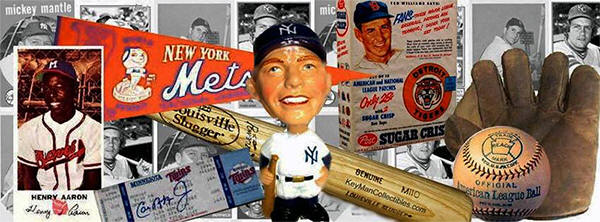| |
Most wartime
(WWII) Minor & Negro League
baseball teams from about 1943-1945,
used this patriotic cover for their
scorecards. The great red White and
blue artwork done by
the artist Valentine, features Uncle Sam swinging
a bat, wearing a U.S. cap,
star-spangled vest, and red striped
pants. The red portion at the bottom
featured an American Flag on the left,
the .10 cents price on a baseball to
the right, centered by the name of the team using the
program.
This 1945 "Official Score
Book" was used by the "Lucky" Portland
BEAVERS, a Double-A team of the Pacific
Coast League. The team used this cover
from 1943-1945. Other noted teams that
used this cover include: the San
Francisco Seals, Mobile Bears,
Louisville Colonels, St. Paul Saints,
Toledo Mud Hens, and the Chicago Brown
Bombers of the Negro League.
The Back cover has a coupon for a chance to "WIN A $500. WAR BOND"
courtesy of - the Portland Bottling Co.
Bottlers of 7-UP. You needed to be
present when the drawing was made
during the last game of the season. The
$500. War Bond Drawing was standard for
the back cover but with different
sponsors, local to the baseball team.
The centerfold features the visiting teams scorecard followed by the
Portland Beaves on the next page.
Advertisements include, Hillerich &
Bradsby co. "Louisville Slugger Bats
Standard Wherever Baseball is played,
both teams use them" The score book
also promotes the buying war Bonds
stating "Put the Pay in Patriotism -
Buy Another War Bond Today" There are
also raffles held at each Saturday and
Sunday ball game sponsored by a number
of local "Patriotic Portland Business
Institutions"
Each scorecard is provided with unique
"War Bond Lucky Number" and during the
playing of each Saturday & Sunday home
games, some lucky Beaver baseball fan
will win a $25.00 War Bond. An
advertisement for the Durham & Bates
insurance agency included a ballot for
fans to elect the Portland's most
popular player, the winning player
would receive a $100. War Bond. The
Commercial Iron Works advertised, "PLAY
BALL! with the men on the firing line.
Men needed at once to build and repair
fighting ships for the U.S. Navy!"
|
|


